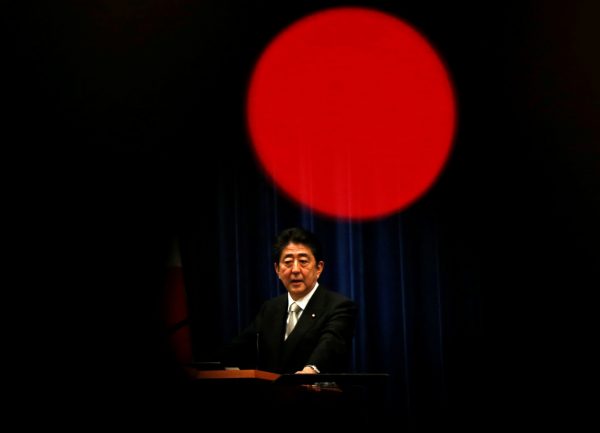Conscious of the public perception that he is ‘arrogant’, Abe adopted a conciliatory line at his first post-election press conference on the question of revising the constitution. Having remained largely silent on the issue during the campaign itself, he expressed a desire to build a broadly based consensus on constitutional reform with the opposition parties — particularly with the Party of Hope, which is not averse to the idea in principle. A few days later, Komeito Party leader Natsuo Yamaguchi reminded him that ‘the administration should be managed … in a humble and sincere way without acting arrogantly’. Post-election LDP caucuses have also emphasised the need for a careful and modest approach to politics and for the administration to be humble.
But some in the LDP and in government — including Abe — were not listening. It did not take long for the arrogance perceived by many voters as the hallmark of the Abe prime ministership to resurface. First, the government attempted to limit the special post-election Diet session to just a few days. Second, it demanded that the amount of time given to the opposition to ask questions during Diet proceedings be slashed.
These actions followed the Abe administration’s earlier refusal to comply with opposition party demands to hold an extraordinary session of the Diet to debate the ‘school scandals’ that had beset his administration earlier in the year. This resulted in a complete halt to Diet debate from the beginning of August until November and enabled the Prime Minister to avoid further questioning on the issue from the Opposition.
Abe was then able to use the Lower House election to break the whole momentum of the scandals while failing to live up to his promise to provide voters with ‘thorough and careful explanations’ when on the campaign trail.
The re-elected Abe government is now seeking to institutionalise limits on Opposition powers to tackle him on this and other issues. Under the new system, the allocation of question time in the Diet would reflect the number of seats held by each party in the Lower House. This would drastically cut the amount of time given to members of the Opposition to ask embarrassing questions of the government in line with the 70–30 split of seats between the LDP–Komeito coalition and the opposition. It would be almost the exact reverse of the existing arrangement established by the former Democratic Party of Japan administration in 2010 when it upped the ratio of questions to opposition parties to 80–20 in response to an LDP request.
Chief Cabinet Secretary Yoshihide Suga gave his full support to the new proposal: ‘the claim that question time should be allocated in accordance with the number of seats held by each [party] caucus is very understandable considering how the people who went to vote must feel’.
Others on the LDP side were not so supportive, with leading lights such as former LDP secretary-general and Abe rival Shigeru Ishiba and LDP executive Shinjiro Koizumi voicing their objections. They reflected some resentment in the party against the overweening power of the Abe-led prime ministerial executive. There are concerns that it has cut into party influence over both policy and political matters — including how to manage the government and relations with the opposition. The government’s proposal is also opposed by a majority of respondents in public opinion polls.
Chairman of the LDP’s Diet Affairs Committee, Hiroshi Moriyama, has now offered the Constitutional Democratic Party of Japan (CDPJ) a 50–50 split, which it has rejected despite the proposal gaining public support. The Opposition continues to emphasise the scrutinising and checking functions of the legislature, with the CDPJ promising to establish an investigation team to look further into Abe’s ‘school scandals’. The prime minister, however, continues to argue that the allocation of time for questions should better reflect each party’s numbers in the Lower House.
It is difficult to avoid concluding that the Abe executive is attempting to take advantage of the ruling coalition’s overwhelming majority to curb opposition party rights in parliament and to punish them for pursuing the administration so assiduously over the ‘school scandals’ that saw approval ratings for the Abe cabinet plummet.
More generally, the issue goes to the heart of the accountability of democratically elected governments. The proposal would lead to substantially truncated rights for the opposition to hold the government accountable and even reveals a contempt for parliament by assuming that a larger majority justifies a corresponding decline in the rights of the minority. Indeed, one could argue that the bigger a ruling party’s majority, the more important it is that the prime minister and his government are held to account.
The Abe administration seems to be challenging the accepted system of constitutional checks and balances and to be moving towards more authoritarian government. This raises the question whether an administration that takes such measures is fully committed to democratic principles and whether it should be leading the debate on constitutional reform — particularly if it seeks to wind back checks and balances in other areas.
Aurelia George Mulgan is a Professor at the University of New South Wales, Canberra.


Seems like it did not take long after the election for Abe’s true colors to become apparent. Like many, if not most, long serving leaders he seems to believe that he should be immune to any serious questioning of such practices as those suggested by the so called ‘school scandals.’
The Japanese electorate is already finding out that by voting to keep the LDP in power in this most recent election one ‘should be careful what one asks for because one might get it.’